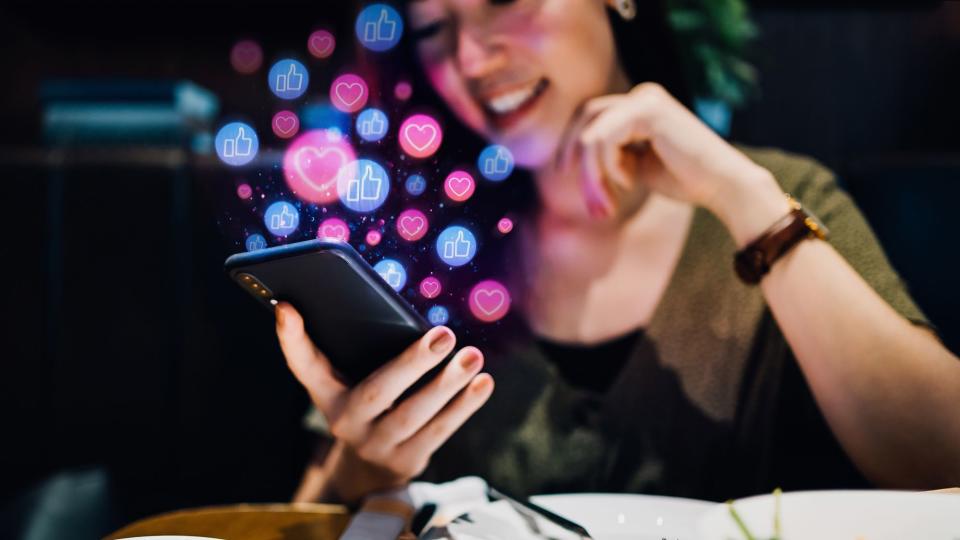The Most Popular Inspiration for Plastic Surgery Is Yourself

Sarah Maiden
In 2021 you don't have to be a Photoshop wizard to get your selfie Instagram grid ready. That bump on the bridge of your nose? The cystic acne on your jawline? Not quite chiseled enough cheekbones? There's an editing app (or three) for all of the above. And plastic surgeons have seen them all — in every combination imaginable.
Instead of photos of celebrities on red carpets or magazine covers, plastic surgeons and cosmetic dermatologists are reporting that Millennial and Gen Z patients are bringing in heavily altered photos of Insta-famous influencers — and themselves — as the inspiration for their cosmetic procedures.
"There's no reality anymore."
—Dr. Dara Liotta, double-board certified plastic and reconstructive surgeon
In the 2020 American Academy of Facial Plastic and Reconstructive Surgery annual survey, 72% of AAFPRS members reported patients seeking cosmetic procedures to look better for their selfies in the previous year, up 15% from 2018.
"During consultations, patients used to say 'I like Blake Lively's nose,' for example, and we could see normal pictures of Blake Lively," says Dr. Dara Liotta, a double board-certified facial plastic and reconstructive surgeon in New York City. "But now, if they bring me a picture of someone on Instagram and we flip through their feed, they'll have different noses in every photo. None of them are real because they're filtered or altered with Facetune or Photoshop. There's no reality anymore."
Dr. Catherine S. Chang, a board-certified plastic and reconstructive surgeon at Cassileth Plastic Surgery & Skin Care in Beverly Hills, often experiences patients bringing in edited photos of themselves as reference for their desired surgery results as well.
"There has been a shift in the past couple of years," Dr. Chang adds. "People don't bring in photos of celebrities anymore, they bring in Photoshopped or Facetuned selfies that they've done themselves."
According to a new study form the University of London's Gender and Sexualities Research Centre, 90% of young women in the U.K. reported using filters or editing their photos. Since Facetune landed in the Apple App store in 2013, along with the slew of photo-editing apps and built-in Instagram filters that have followed, reshaping "undesirable" features like your nose or erasing "imperfections" like acne and large pores has never been easier.
RELATED: A Post-Quarantine Plastic Surgery Boom Is Happening
Slowly dragging your fingertip over a highlighted area of your face in an app is quick and easy, but the simplicity of this task doesn't translate to what's physically viable in surgery — a permanent change that you can't undo with a tap.
"On the face, every millimeter is so important, so what you think is a small difference on Facetune, for it to be achieved by surgery, is actually a big difference," Dr. Chang explains. "That's something people don't quite understand."

Innocenti/Getty Images
Dr. Paul Jarrod Frank, celebrity cosmetic dermatologist in New York City and author of The Pro-Aging Playbook and creator of The Pro-Aging Podcast says patients, who are more familiar and comfortable with cosmetic treatments thanks to social media, are beginning to view them as grooming rather than medical procedures. "People come in for non-surgical nose jobs, lips, and lasers, and when they see it on Instagram, they just assume that there's no down time or recovery, and that's not the case," he shares. "For any treatment that can make a dramatic improvement, there's also some downsides."
RELATED: Everything You Need to Know About Cheek Filler, According to Doctors
Both Drs. Chang and Liotta most often encounter unrealistic expectations during consultations for rhinoplasty.
"Recently a patient brought in a Facetuned image of themselves where their nose was made extremely small. If you did that in surgery, the nose wouldn't be functional and would eventually collapse," says Dr. Chang. "When I explain this, sometimes patients will reply, 'Oh well I can do that on a photo.' But you can't do that in surgery because you wouldn't be able to breathe."
The editing discrepancies can go unnoticed to the untrained eye when you're scrolling through someone's feed, especially when selfies are broken up with palate-cleansing sunset photos, restaurant tablescapes, and outfit shots.
"When someone shows me an Insta-famous person where there are a ton of different pictures available, I'll show them four or five photos and point out the differences in the noses, and I would say 80 to 90% of people then understand what isn't possible surgically," says Dr. Liotta.
RELATED: Are Injections The Secret to Curing Dark Circles for Good?
What also makes filters so unrealistic is how they light the face. "The filters look good because they completely warp the way the light hits you," Dr. Liotta adds. "The way the light hits you in a filter is not anatomic at all."

d3sign/Getty Images
Self-Photoshopped or Facetuned images are a bit easier to work with, but still not ideal. However, at least if the patient brings in an edited image of their own face, the doctor is starting with that person's biological facial structure, and not an influencer whose face may be built differently.
"If someone has a picture of themselves that they're Photoshopping, and to be honest the software we're using to show you potential before-and-after photos in the office literally just pulls lines or plays with light and shadow," Dr. Liotta explains. "That's much more realistic than something that totally wipes out shadows."
Rhinoplasty aside, patients' quests for smooth, poreless skin, is a struggle that surgeons and dermatologists have been dealing with for decades. However, this desire has intensified over the past year, with everyone sequestered at home in front of their computer, phone, and tablet screens wanting to look their best, whether it's on social media or video conferencing apps like Zoom.
"With filters your skin is pore-less and pristine, so I always explain that someone in their 60s will never look like that because the skin texture at that age is really hard to change," says Dr. Chang. "I always explain to someone who's older that their skin will not look like it did when they were in their 20s. Sometimes you can laser it to make it a little bit nicer, and there are things you can definitely do to smooth the skin, but to have it look like a filtered image is impossible."
RELATED: Why This Harvard Researcher Thinks We "Don't Have To" Age
Dr. Chang says 90% of her patients understand this when explained to them, but it doesn't stop people from using filters, which are now considered the norm on social media.
"Everybody is wanting to be more sculpted now than ever before, and I think it's because people are comparing themselves to others who are heavily filtered and photoshopped," says Dr. Chang. "It's almost become this new normal of what people are expecting to look like when they take a selfie. I always have to explain that it's just not realistic."
"Ideally we would experience love, acceptance and be celebrated for who we naturally are versus an alternative version of ourselves."
—Dr. Logan Persons Jones, psychologist and director of Clarity Therapy in New York City
RELATED: Everything You Need to Know About Getting Facial Fillers
It's natural to want to feel accepted, but rewarding altered photos with "likes" celebrates beauty standards that aren't rooted in reality.
"Each time we elevate airbrushed and altered images of people, or compliment someone who has had work done, we are giving someone 'feel good' dopamine and 'love hormone' oxytocin hits, creating a neurological cascade of rewarding feelings," says Dr. Logan Persons Jones, psychologist and director of Clarity Therapy in New York City. "Unfortunately, by posting these altered images we are inviting people to love these alternative physical presentations of ourselves. Ideally we would experience love, acceptance and be celebrated for who we naturally are versus an alternative version of ourselves like these avatars."
The unrealistic expectations set by social media don't just pressure patients, but medical professionals, too.
"It also has warped our expectations as surgeons, to be honest. What I would consider to be a really nice result 10 years ago, even from my own rhinoplasty, I now expect to be much more perfect," says Dr. Liotta. "I follow all of my patients on social media and I see more photos of my patients post-op than ever before. Before I saw them three times and that was the end of it. Now I see them daily on Stories and in pictures, which for me is great because it helps me continue to learn, but it almost puts unrealistic expectations on ourselves as surgeons."
VIDEO: InStyle Editors on... Post Pandemic Plastic Surgery Boom
As long as people use them, social media filters and photo editing apps aren't going anywhere. But an easy solution would be to disclose when photos have been altered, the same way influencers are required to disclose when they've been paid or gifted by the brands they're posting about.
"One day, it may be beneficial to place disclaimers, similar to business advertisements, that an image has been enhanced so that people can be reminded that what is being marketed to them isn't a natural occurrence," says Dr. Jones.
In the U.K. this is already common practice, as the country recently banned influencers from retouching and filtering photos advertising cosmetic products. Will #filter be the new #ad? Honestly, it couldn't hurt.
This is the Glow Up, an examination of the most popular cosmetic procedures and products today, using survey data straight from readers like you.


